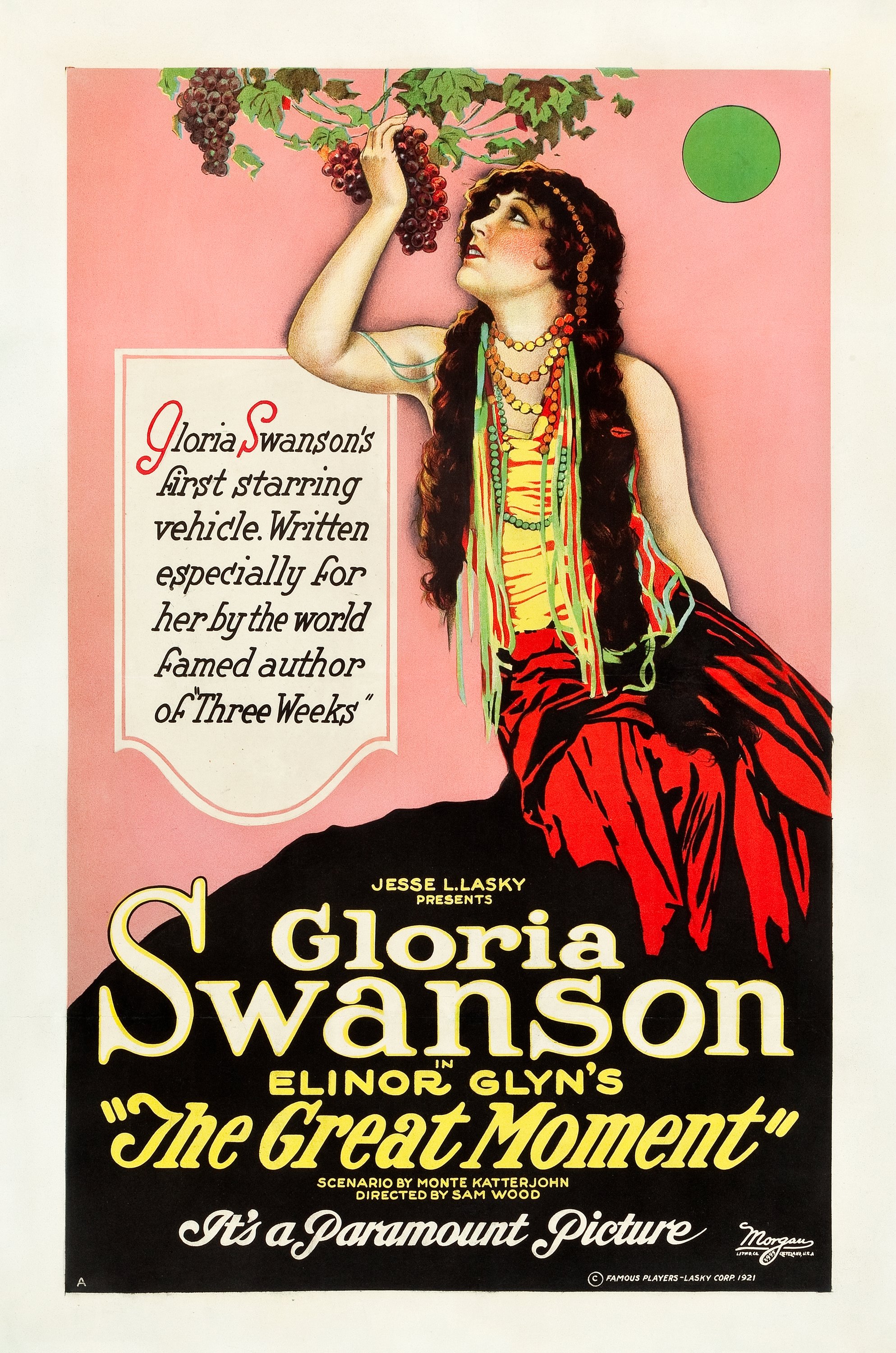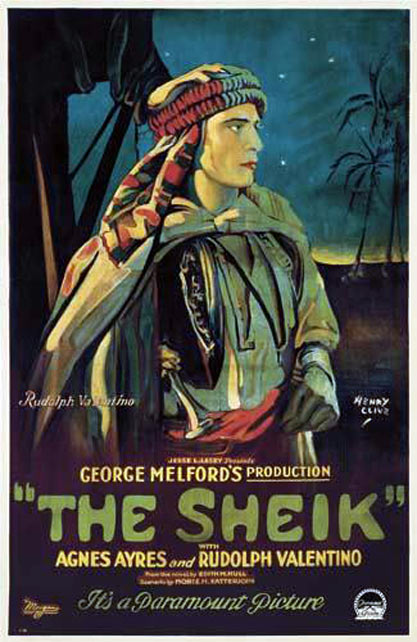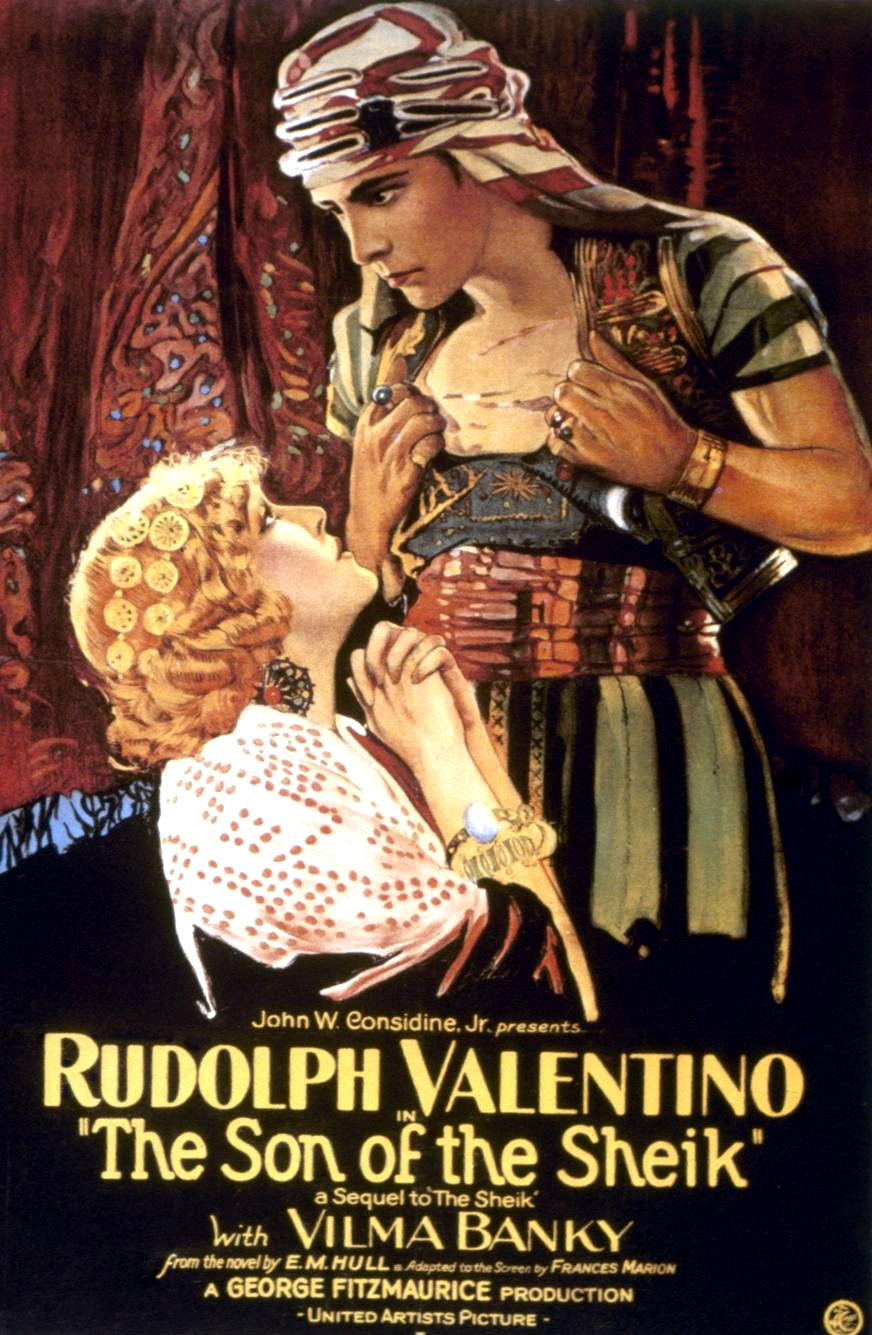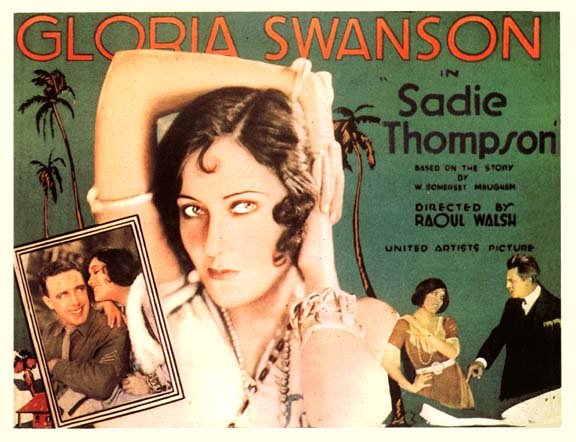.

Gloria Swanson in The Great Moment (1921), film poster
Not you, lean quarterlies and swarthy periodicals
with your studious incursions toward the pomposity of ants,
nor you, experimental theatre in which Emotive Fruition
is wedding Poetic Insight perpetually, nor you,
promenading Grand Opera, obvious as an ear (though you
are close to my heart), but you, Motion Picture Industry,
it’s you I love!
And give credit where it’s due: not to my starched nurse, who taught me
how to be bad and not bad rather than good (and has lately availed
herself of this information), not to the Catholic Church
which is at best an oversolemn introduction to cosmic entertainment,
not to the American Legion, which hates everybody, but to you,
glorious Silver Screen, tragic Technicolor, amorous Cinemascope,
stretching Vistavision and startling Stereophonic Sound, with all
your heavenly dimensions and reverberations and iconoclasms! To
Richard Bartelhmess as the "tol'able boy" barefoot and in pants,
Jeanette MacDonald of the flaming hair and lips and long, long neck,
Sue Carroll as she sits for eternity on the damaged fender of a car
and smiles, Ginger Rogers with her pageboy bob like a sausage
on her shuffling shoulders, peach-melba-voiced Fred Astaire of the feet,
Eric von Stroheim, the seducer of mountain climbers' gasping spouses,
the Tarzans, each and every one of you (I cannot bring myself to prefer
Johnny Weissmuller to Lex Barker, I cannot!), Mae West in a furry sled,
her bordello radiance and bland remarks, Rudolph Valentino of the moon,
its crushing passions and moonlike, too, the gentle Norma Shearer,
Miriam Hopkins dropping her champagne glass off Joel McCrea's yacht
and crying into the dappled sea, Clark Gable rescuing Gene Tierney
from Russia and Allan Jones rescuing Kitty Carlisle from Harpo Marx,
Cornel Wilde coughing blood on the piano keys while Merle Oberon berates,
Marilyn Monroe in her little spike heels reeling through Niagara Falls,
Joseph Cotten puzzling and Orson Welles puzzled and Dolores del Rio
eating orchids for lunch and breaking mirrors, Gloria Swanson reclining,
and Jean Harlow reclining and wiggling, and Alice Faye reclining
and wiggling and singing, Myrna Loy being calm and wise, William Powell
in his stunning urbanity, Elizabeth Taylor blossoming, yes, to you
and to all you others, the great, the near-great, the featured, the extras
who pass quickly and return in dreams saying your one or two lines,
my love!
Long may you illumine spaces with your marvelous appearances, delays
and enunciations, and may the money of the world glitteringly cover you
as you rest after a long day under the klieg lights with your faces
in packs for our edification, the way the clouds come often at night
but the heavens operate on the star system. It is a divine precedent
you perpetuate! Roll on, wheels of celluloid, as the great earth rolls on!

Rudolph Valentino in The Sheik (1926), film poster

Rudolph Valentino in Son of the Sheik (1926), film poster

Rudolph Valentino in Son of the Sheik (1926), film poster

Amazing outfit Valentino's got on in that next-to-last poster! It's better than anything from the '60s. I wonder how different the movies would have been without the Hays code.
ReplyDeleteArtur.
Great to read this and see these images. It's corny to say, but those were the days, or so it seems. I suppose one could rewrite this including some of today's stars but it wouldn't be the same.
ReplyDeleteOne of my favorite poems of all time - and i LOVE the images you paired it with, none of which I'd ever seen before.
ReplyDeleteThe best.
I stayed mesmerized by the face of the blond woman with Valentino. Stupid face and gesture! Why the ideal of woman of that time (30's?) was so annoying?. Sorry, my comment it's completely off topic.
ReplyDeleteIn the Son of the Sheik (1926) Valentino plays both the older Sheik and his hot-blooded son Ahmed. After Ahmed is captured and tortured by a gang of bandits, he falls victim to a tragic misunderstanding, supposing Yasmin, the bandit chief's daughter, to have been responsible for his sufferings. Having escaped, he takes her off to his tent and...you guessed it.
ReplyDeleteThe poster is based on this scene. In it, Ahmed is baring his breast to show the terrified Yasmin the mutilation inflicted by the bandit gang.
(Yes, Artur, that outfit might have been smuggled into Mick Jagger's wardrobe closet without anyone batting an eye.)
Later, however, the older Sheik's harsh words cause the Son to bethink himself; he and the now-vindicated Yasmin fall in love & c.
Valentino was 31 at the time, a sort of androgynous sexual icon invented by Hollywood for its own uses.
A few months after making this film he collapsed and died of peritonitis.
Beautiful deep thrilling masterfully concocted words. And images. But mainly the words. Thank you for this.
ReplyDeleteWalter M.
Tom: On this cinematic new year's eve of award-giving (btw, you've thrown a great party so far) let us not forget The Gold Diggers of 1933 -- based on a musical by one Avery Hopwood, whose naming rights literary award was bestowed upon two ann arbor legends, Frank O'Hara and Tom Clark. Hooray for Hoppywood!
ReplyDeleteFrank would have regarded that comment as worth more than any statuette, I think, Walter.
ReplyDeleteKent, you've brought back memories.
Frank went from Harvard to Ann Arbor, where he took an MA and won a Hopwood prize for poetry in 1961.
A few years later I did something similar.
A few years after that (1968), Angelica and I went with two poet friends, Ron Padgett and Frank's great admirer Ted Berrigan, to Ann Arbor to do some readings. It was this time of year, terribly cold, everything under hard ice and snow, and Ted was never much into polar exploring; but nonetheless he insisted on being taken to inspect (from out in the snowy sidewalk) the modest rooming house where Frank had written those Hopwood poems.
(To him that crumby rooming house might as well have been the Sistine Chapel.)
Tom: YOU sir, are the one restoring essential memories every day for us all.
ReplyDelete(Funny, google seems to have lost all memory of me and my doowman ID)
I retract. Now that I saw the scene, I find that the actress has a different strength and elegance that were absent from the stereotype of the poster (Son of the Sheik).
ReplyDeleteYes, Julia, the context counts.
ReplyDeleteSound Wizard Walter Murch has helpfully supplied this direct link to F. O'H. reading the poem.
ReplyDeleteMany thanks, Walter!